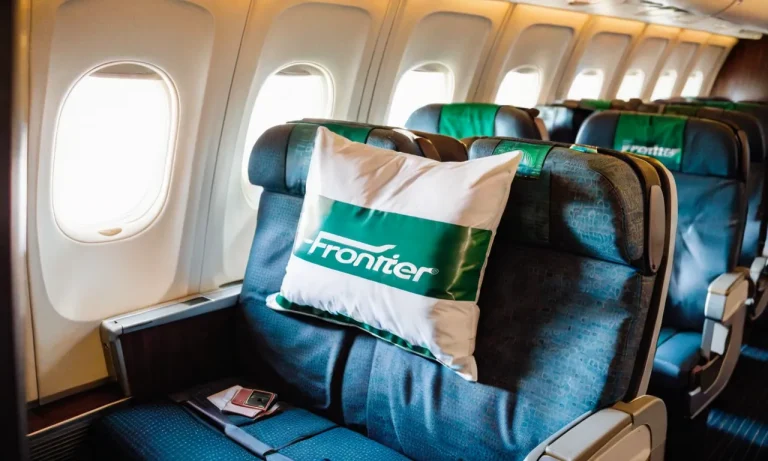Which Airlines Have The Most Flight Cancellations?
Flight cancellations can wreak havoc on travel plans. If you’ve ever arrived at the airport only to discover your flight was cancelled, you know how frustrating it can be. So when booking air travel, it’s helpful to know which airlines have the most cancellations.
If you’re short on time, here’s a quick answer: Spirit and Frontier airlines have the highest cancellation rates among U.S. carriers. On average, around 4% of Spirit flights and 3% of Frontier flights are cancelled.
In this nearly 3,000 word guide, we’ll break down the U.S. airlines with the most flight cancellations based on government data. You’ll learn key stats on cancellation rates plus reasons why some airlines cancel more flights. We’ll also provide tips to minimize chances your flight is cancelled.
Background on Airline Cancellation Rates
How Government Tracks Cancellations
The U.S. Department of Transportation’s Aviation Consumer Protection Division tracks flight cancellations, delays, mishandled baggage, and other issues. They compile this data based on regular reports from the major U.S. airlines.
This oversight helps ensure airlines follow consumer protection rules and helps inform air travelers about best and worst performers.
Cancellation Stats Overview
According to the DOT, about 2% of flights are canceled in the U.S. annually, impacting millions of travelers. Cancellation rates fluctuate by airline, route, season, and other factors. Peak summer travel season and winter storms tend to see more cancellations.
| 2019 Cancellation Rate | 2.2% |
| 2020 Cancellation Rate | 5.0%* |
| 2021 Cancellation Rate | 1.9% |
*Impacted by COVID-19 pandemic
Main Causes of Cancellations
The primary triggers of canceled flights include:
- Mechanical issues with the plane
- Weather events like storms, winds, or visibility issues
- Air traffic control delays and airport capacity issues
- Pilot or flight crew availability
- Security threats or other safety issues
Airlines aim to minimize cancellations to avoid inconveniencing customers, but some cancellations are unavoidable for safety. When flights are canceled, most airlines will rebook passengers on other flights at no additional charge.
Which Airlines Have the Most Cancellations?
Spirit Airlines
Spirit Airlines is known for having a high number of flight cancellations. While they offer low-cost fares, their cancellation rates are relatively higher compared to other airlines. It is important for travelers to be aware of this when booking a flight with Spirit Airlines and to have a backup plan in case of any disruptions to their travel plans.
Frontier Airlines
Frontier Airlines is another airline that has a significant number of flight cancellations. While they also offer budget-friendly fares, their cancellation rates may be higher due to various reasons such as weather conditions or mechanical issues.
Passengers flying with Frontier Airlines should be prepared for the possibility of flight disruptions and should stay updated with any changes to their flight status.
American Airlines
American Airlines, one of the largest airlines in the United States, also experiences a considerable number of flight cancellations. This can be attributed to a variety of factors, including the size and complexity of their operations.
While American Airlines strives to minimize cancellations, it is recommended for passengers to monitor their flight status and make alternative arrangements if necessary.
United Airlines
United Airlines, another major player in the airline industry, has been known to have a significant number of flight cancellations. As with other airlines, cancellations can occur due to factors beyond their control, such as weather or air traffic congestion.
Passengers flying with United Airlines should be prepared for the possibility of cancellations and should stay informed about any changes to their travel plans.
Delta Air Lines
Delta Air Lines, one of the largest global airlines, has a relatively lower number of flight cancellations compared to some other carriers. However, cancellations can still occur due to various reasons.
Delta Air Lines has a good track record of providing timely updates to passengers in case of any disruptions to their flights, allowing them to make alternative arrangements if necessary.
Alaska Airlines
Alaska Airlines, known for its excellent customer service, has a relatively lower number of flight cancellations compared to some other airlines. This can be attributed to their efficient operations and proactive approach in managing potential disruptions.
Passengers flying with Alaska Airlines can expect a higher level of reliability when it comes to their flights.
Hawaiian Airlines
Hawaiian Airlines, the largest airline in Hawaii, has a good reputation for on-time performance and a relatively low number of flight cancellations. This can be attributed to the favorable weather conditions in Hawaii and their meticulous planning to ensure smooth operations.
Passengers flying with Hawaiian Airlines can have confidence in the reliability of their flights.
JetBlue
JetBlue, a low-cost airline, has a relatively low number of flight cancellations compared to some other carriers. While cancellations can still occur, JetBlue has made efforts to improve its operational efficiency and minimize disruptions.
Passengers can enjoy a higher degree of reliability when traveling with JetBlue.
Southwest Airlines
Southwest Airlines, known for its customer-friendly policies, has a relatively low number of flight cancellations. They have a strong operational track record and a proactive approach to managing disruptions.
Passengers flying with Southwest Airlines can expect a higher level of reliability when it comes to their flights.
It is important to note that flight cancellations can occur with any airline, regardless of their track record. Factors such as weather conditions, air traffic congestion, or unforeseen circumstances can lead to flight disruptions.
Passengers should always stay informed about their flight status, consider travel insurance, and have a backup plan in case of any cancellations or delays.
Tips to Avoid Flight Cancellations
Book Early Morning Flights
One of the best ways to minimize the risk of flight cancellations is to book early morning flights. Airlines often face a domino effect when one flight is delayed or cancelled, leading to subsequent delays and cancellations throughout the day.
By choosing an early morning flight, you reduce the chances of being affected by these cascading disruptions. Additionally, early morning flights tend to have less air traffic, increasing the likelihood of an on-time departure.
Avoid Connecting Flights
Another tip to avoid flight cancellations is to avoid connecting flights whenever possible. Connecting flights increase the complexity of your travel itinerary and introduce more opportunities for delays or cancellations.
If there’s a direct flight to your destination, it’s generally a better option to choose that instead. Direct flights not only eliminate the risk of missing a connection due to delays but also decrease the overall travel time.
Fly Direct When Possible
While connecting flights should be avoided, sometimes they are unavoidable due to limited flight options or specific travel requirements. In such cases, it’s essential to choose airlines that have a good track record of on-time arrivals and low cancellation rates.
Researching the performance and reliability of different airlines can help you make an informed decision. Websites like FlightStats provide real-time flight data and statistics that can assist in identifying airlines with a better track record.
Have Backup Plans
Even with careful planning, flight cancellations can still occur. It’s always a good idea to have backup plans in place in case of unforeseen circumstances. This could include having alternative flights or routes in mind, knowing the airline’s rebooking policies, or having travel insurance that covers trip disruptions.
By being prepared, you can navigate through flight cancellations more smoothly and minimize the impact on your travel plans.
What to Do If Your Flight is Cancelled
Get Rebooked Quickly
When your flight is cancelled, it’s important to act fast to secure an alternative arrangement. Head straight to the airline’s customer service desk or call their helpline to get rebooked on the next available flight.
Be prepared with your booking details and any alternative flight options you may want to suggest. Remember to stay calm and polite, as the airline staff are more likely to assist you if you approach the situation with a positive attitude.
Know Your Compensation Rights
If your flight is cancelled due to reasons within the airline’s control, such as technical issues or crew shortages, you may be entitled to compensation under certain circumstances. The amount of compensation can vary depending on the distance of the flight and the length of the delay.
Familiarize yourself with the regulations and guidelines set by the relevant aviation authority or governing body, such as the European Union’s Regulation 261/2004 for flights departing from or arriving in European Union countries.
These regulations outline the compensation you may be eligible for and the conditions that need to be met for a successful claim.
Use Social Media to Vent Frustrations
In today’s digital age, social media platforms have become powerful tools for consumers to voice their concerns and grievances. If you’re frustrated with your flight cancellation experience, consider using social media to express your dissatisfaction.
Many airlines have dedicated customer service teams monitoring their social media accounts and are often quick to respond to customer complaints. Ensure you mention the airline’s official handle and use relevant hashtags to increase the visibility of your post.
However, it’s important to remain respectful and avoid using offensive language, as this may hinder the resolution process.
Remember, flight cancellations can be a frustrating experience, but knowing what to do and being prepared can help minimize the inconvenience. Stay informed about your rights as a passenger, be proactive in seeking alternative arrangements, and utilize the available channels to voice your concerns.
By doing so, you increase your chances of a smoother and more satisfactory resolution to the situation.
Conclusion
While no airline is immune to the occasional cancellation, Spirit and Frontier have markedly higher cancellation rates than other major U.S. carriers. Factors like staffing shortages, weather, mechanical issues, and more can trigger cancellations.
By booking early flights, avoiding connections when possible, and having backup plans, you can minimize chances your flight is cancelled. And if your trip is disrupted, act quickly to get rebooked while knowing your rights to compensation.
Safe travels! With the insights on airline cancellation rates and prevention tips, you can better ensure smooth sailing for your next flight.








